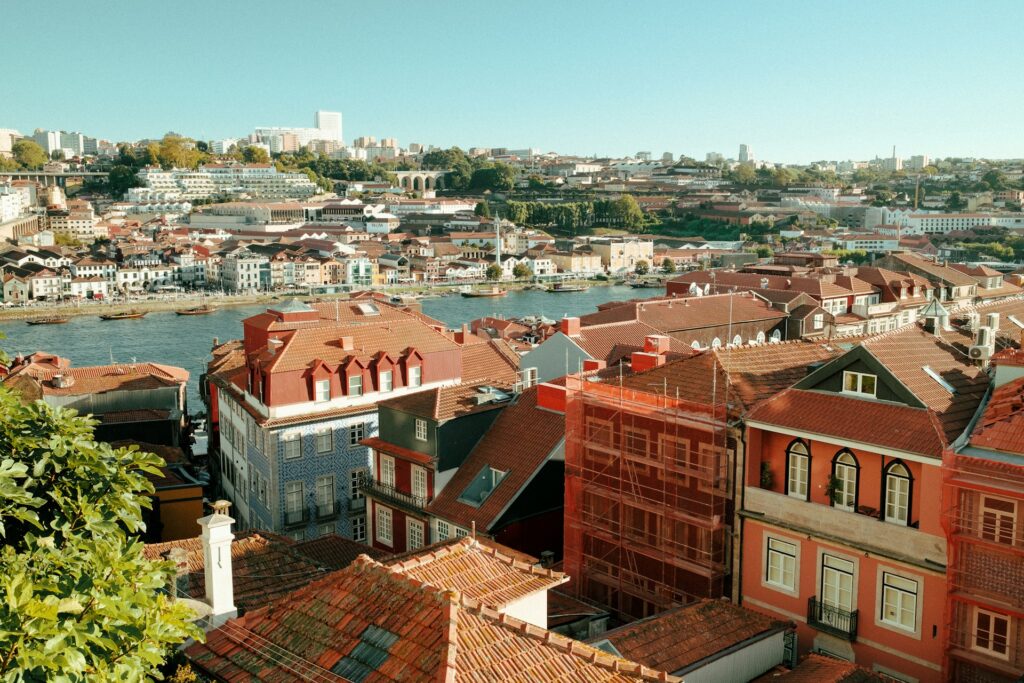If you’re choosing between Lisbon and Porto, you’re not alone. These two cities attract thousands of expats each year but for very different reasons.
Lisbon stands out for its fast pace, historic charm, and global recognition. It recently won the title of Best City Break Destination in 2024 at the Star Awards, which says a lot about its appeal to travelers and residents alike. It also topped the charts in VisaGuide.World’s list of top European capitals with an impressive low score of 29.83, based on what people value most in a city—from food to friendliness. Even more encouraging for long-term stays, Lisbon was also named the best-value city break in Europe by the Post Office Travel Money barometer.
On the other hand, Porto has a more intimate, laid-back feel. It recently earned 10th place in Time Out’s Best Cities in the World list. Plus, Condé Nast Traveller’s Readers’ Choice Awards also ranked Porto among the top cities globally in 2024.
These aren’t just tourist awards, they show what life might feel like there. In this guide, we’ll break down life in Lisbon vs. Porto based on cost, culture, housing, safety, weather, and more. This will help you make a decision that fits your lifestyle, not just a postcard.
Where is Lisbon and Porto?
Lisbon sits on the southern coast of central Portugal, wrapping around the Tagus River. It’s the country’s capital and largest city, with about 2.8 million people in its wider metro area. Expats often describe it as bustling and energetic.
Its steep hills, yellow trams, and tiled facades create a postcard-perfect backdrop but also a fast-moving, high-energy place to live.
Porto, in the north, has a very different feel. Built along the Douro River, its compact city center and UNESCO-listed old town make it feel more walkable and cozy.
While its population is smaller, around 1.4 million in the metro region – it still offers everything you’d expect in a major city: great food, nightlife, shopping, and seaside access.
The vibe in Lisbon is global and modern, while Porto leans traditional and intimate. Still, Porto is far from sleepy – it’s set to host the Michelin Guide Gala in 2025, a nod to its growing culinary and cultural presence.
If you’re looking for a fast-paced city with global connections, Lisbon may feel more familiar. If you prefer smaller crowds, less noise, and more tradition, Porto might win your heart.

Cost of Living in Lisbon and Porto
Living costs in Lisbon and Porto are lower than in many major Western European cities, but differences between the two still matter, especially for expats planning long-term stays.
Lisbon, as the capital, tends to be more expensive overall. Rent in central areas like Baixa, Alfama, or Príncipe Real can easily stretch your monthly budget. Groceries and dining out are also slightly costlier compared to Porto. Still, Lisbon has earned praise for value. The Guardian’s City Costs Barometer named it the best-value city break in Europe, highlighting how much you can get without overspending.
Porto, in contrast, remains more budget-friendly. Rents are generally 10–20% lower, and eating out at local tascas or cafés often costs less. A decent one-bedroom apartment near the city center might cost €750 in Porto, while a similar place in Lisbon can go upwards of €1,100. Even transport, coffee, and gym memberships are slightly cheaper in Porto.
Utilities, healthcare, and public services are priced similarly across Portugal, so your core costs won’t vary too much. But for renters, students, or digital nomads, Porto wins for affordability without sacrificing quality of life.
Groceries
When moving to a new city, knowing how much daily life will cost helps avoid surprises. While Lisbon and Porto are both affordable by Western European standards, Porto often has the edge when it comes to daily savings.
Let’s break down some common everyday expenses in both cities (approximate prices as of early 2025):
In Lisbon, groceries, eating out, and even a haircut will often cost a bit more, especially in touristy or upscale neighborhoods. Porto’s prices are consistently lower, and residents often comment on how far their euros go when it comes to weekly shopping or lunch at a café.
While Lisbon has more variety and luxury services, Porto gives expats a more budget-friendly daily life without cutting corners on quality.

Portuguese Housing Market
When it comes to buying property, both cities are active but follow different trends.
Lisbon Housing Market
In Lisbon, property prices have risen steeply over the past decade. Popular with investors and digital nomads, Lisbon’s central properties are among the priciest in Portugal. Areas like Chiado, Estrela, and Avenida da Liberdade are in high demand. For those willing to live on the city’s outskirts (e.g., Amadora or Odivelas), prices are more manageable and still close to the center via metro or train.
Porto Housing Market
In Porto, the market has traditionally been more stable. However, that’s changing. According to Knight Frank’s 2023 Wealth Report, Porto ranked 10th among the world’s fastest-growing luxury real estate markets. Areas like Foz do Douro and Boavista are now attracting more international buyers.
Moreover, The Portugal News reports that many property owners in Porto are converting commercial spaces into residential homes to meet rising demand. This is good news for buyers and renters looking for modern apartments in central areas.
If you’re considering buying, Lisbon’s market is more mature but expensive. Porto still has room for growth and a stronger chance of finding a bargain or investing in an up-and-coming neighborhood.
Public Transports in Portugal
In both cities, public transporPortugal Airports: What Travelers Need to Know in 2025t is reliable and easy to use, though the experience feels different depending on where you are.
Lisbon has a more extensive transport system. The metro covers most of the city’s neighborhoods, and frequent trams and buses help you get around even in the hilly, narrow streets of the old town. There’s also a ferry system that connects parts of Lisbon to Almada across the river. The Viva Viagem card makes it easy to pay for all transport types.
Lisbon is also well connected for international travel. The airport is close to the city center, reachable in about 20 minutes via metro. This proximity makes short getaways or visits back home very convenient for expats.
Porto, although smaller, has a simpler and less crowded system. Its metro is clean, modern, and reaches from the airport to downtown and even into nearby towns. Buses and trams complement the network, and walking is a pleasant way to get around in central areas.
Porto’s airport is also well-rated and expanding its international routes each year. While it may not offer as many direct flights as Lisbon, it’s still well linked to major European hubs.
If you don’t plan to own a car, both cities make day-to-day life easy. Lisbon gives you reach. Porto gives you simplicity.

Weather – What to Expect Month to Month
Portugal is known for its mild weather, but Lisbon and Porto still differ in climate and comfort.
Lisbon, being farther south, enjoys warmer and sunnier days year-round. Summers are dry and hot, often hitting the mid-30s Celsius (90s Fahrenheit), but the ocean breeze keeps it bearable. Winters are mild, with temperatures rarely falling below 8°C (46°F), though there can be short rainy spells.
Porto, in contrast, is cooler and wetter, especially in the winter. The city gets more rainfall overall, and foggy mornings are common near the Douro River. However, summers are still sunny and pleasant—just not as hot as Lisbon’s.
If you’re someone who enjoys sunny days and outdoor living most of the year, Lisbon may suit you better. Its weather encourages year-round cafés, beach visits, and outdoor festivals. This sunshine has helped it win recognition as one of Europe’s favorite destinations, supported by awards like VisaGuide.World’s best capital to visit in 2024.
Porto, meanwhile, appeals to those who don’t mind wearing a jacket and appreciate cooler evenings, a greener landscape, and fewer tourists during off-seasons. It may not be as dry, but it has its own charm, especially in spring and early autumn.
Culture and Food – Everyday Life with Local Flavor
One of the great things about living in Portugal is how much local life revolves around simple pleasures—shared meals, local traditions, and beautiful public spaces. But when comparing Lisbon and Porto, you’ll notice that each city expresses this lifestyle in its own way.
Lisbon is a melting pot. The city is bigger, more international, and always buzzing. From fado houses in Alfama to rooftop bars in Cais do Sodré, it has a strong blend of old and new. The variety of food is also wider, with influences from Angola, Brazil, India, and beyond. Local markets, street food, and modern restaurants coexist in every corner of the city.
Porto is slower and more traditional, but no less exciting. It’s known for its tile-covered buildings, the riverfront Ribeira district, and its long connection to wine and food. The city will host the Michelin Guide Gala in 2025, showing how seriously it’s now being taken as a culinary destination. Porto’s food scene has evolved far beyond its famous francesinha sandwich and Port wine. From cozy taverns to fine dining spots, it’s building a name for itself one dish at a time.
Both cities celebrate festivals, art, and music but Lisbon has the edge in terms of scale, while Porto gives you a deeper sense of tradition.
Portugal for Remote workers
Both Lisbon and Porto are increasingly welcoming to remote workers, freelancers, and entrepreneurs, but the environments feel different.
Lisbon has long been a hotspot for digital nomads. It has countless coworking spaces, regular networking events, and a large international community. If you’re in tech, marketing, or design, there are dozens of meetups, from casual cafés to formal conferences.
The infrastructure is strong, and the city’s airport makes international travel easy for freelancers working with overseas clients. There’s also a strong startup vibe – many early-stage companies choose Lisbon for its young talent pool and warm climate.
Porto, while slightly quieter on the coworking front, has been growing steadily in this space. Shared offices are popping up in Cedofeita and Bonfim, and remote workers enjoy the calm, creative vibe the city offers.
Rent is lower, cafés are less crowded, and it’s easy to work from home with a steady internet connection. For expats looking for a mix of productivity and peace, Porto can be a smart choice.
Overall, Lisbon feels more global and busy. Porto is more relaxed and personal. Your choice may come down to whether you prefer a bigger professional network or a quieter place to focus.

Portugal Healthcare
Portugal’s healthcare system is known for being well-structured and affordable – two things that matter to expats. Both Lisbon and Porto offer excellent public and private healthcare options, so access to doctors and specialists is never a problem.
In Lisbon, large public hospitals like Hospital de Santa Maria serve the metro area, while private facilities cater to those with health insurance or international plans. Most doctors in private hospitals speak English, and waiting times are typically shorter than in the public system. The city is also home to many specialty clinics, from dental to physical therapy.
Porto has similar standards. Its public hospitals are well-equipped, and private clinics are on the rise, especially around Boavista and Foz. What makes Porto appealing to many expats is the calmer environment—less crowding often means less stress during appointments or checkups.
Portugal also provides access to the SNS24 platform, which helps you book appointments, get health advice, or speak to a nurse – all online or by phone. It’s a helpful service whether you live in a big city or a quieter neighborhood.
In terms of safety, both cities rate very well. Portugal is consistently ranked one of the safest countries in the world. You’ll find that most areas in Lisbon and Porto feel safe for walking, even at night. Expats and solo travelers often highlight this peace of mind as one of the top reasons they feel settled here.
Best Citi for Expats: Which City Feels More Like Home?
Community Size & Support:
- Lisbon has a larger and more active expat scene. There are Facebook groups, language meetups, coworking hubs, and international communities across the city.
- Porto has a smaller expat population, but that can make it easier to build closer local connections.
Work & Career Opportunities:
- Lisbon is home to Portugal’s biggest companies, government offices, and international startups. If you’re job hunting, especially in tech, marketing, or business – Lisbon has more openings.
- Porto has fewer jobs in the corporate world, but it’s growing in tourism, hospitality, and the creative industries. It’s ideal for remote workers and freelancers.
Daily Life & Pace:
- Lisbon is faster-paced, more international, and always busy. Great if you like city life with lots going on.
- Porto is quieter, less crowded, and feels more relaxed. A better fit if you prefer calm surroundings and smaller neighborhoods.
Cost of Living:
- Rent, dining out, and public transport are usually cheaper in Porto. Ideal for retirees or those on a fixed budget.
- Lisbon’s prices are higher for housing but some expats accept the trade-off for the city’s energy and services.
Language & Integration:
- Lisbon has more English speakers, which helps in the early months but may slow your Portuguese learning.
- In Porto, you’re more likely to practice Portuguese in daily life, which many expats see as a positive.
Final Take:
- Choose Lisbon if you want career options, city buzz, and a large international circle.
- Choose Porto if you value lower prices, a slower pace, and easier cultural immersion.

How We can help
Whether you’re leaning toward Lisbon’s fast-moving lifestyle or Porto’s calm and cozy charm, choosing the right city is just the beginning of your relocation journey. From finding a home to handling legal paperwork and adjusting to a new country, the process can feel overwhelming at times.
That’s where a trusted partner can make all the difference. Portugal Residency Advisors, is specialize in helping expats settle in smoothly – whether you’re retiring, starting a new job, or working remotely from Portugal. Their team takes the guesswork out of everything from property searches to visa applications and tax advice.
Here’s what you can expect:
- Help you choose the right city and neighborhood for your needs
- Guide you through property buying or renting, safely and legally
- Assist with D7, D8, or Golden Visa paperwork
- Connect you with reliable lawyers, accountants, and healthcare providers
- Offer practical tips on moving, banking, utilities, and more
Looking to Invest in Portugal?
Explore our newest listings below!
Frequently Asked Questions About Lisbon vs Porto: Which city is better for expats?
Which city is more welcoming for first-time expats - Lisbon or Porto?
Lisbon tends to be more welcoming upfront due to its large international community and English-speaking locals, while Porto offers a more traditional environment but with genuine hospitality.
Is it easier to find work in Lisbon or Porto?
Lisbon has more job openings, especially in tech, tourism, and corporate sectors. Porto is better suited for remote workers, freelancers, and creatives looking for a quieter base.
How much Portuguese do I need to live in either city?
You can get by with English in both cities, especially in Lisbon, but learning basic Portuguese is highly recommended for daily life and integration—more so in Porto.
Which city is better for digital nomads?
Lisbon is better equipped with coworking spaces, networking events, and global services. Porto is catching up and offers a more peaceful setting with fewer distractions.
Can I find affordable rentals in Lisbon or is Porto better for that?
Porto is more budget-friendly for rentals, particularly in central neighborhoods. Lisbon rents are higher, especially in popular areas like Alfama and Bairro Alto.
Which city is safer - Lisbon or Porto?
Both are very safe by European standards. Most expats feel secure walking alone, even at night, in both cities.
Are international schools available in both cities?
Yes, but Lisbon has more options. Porto has fewer but still well-rated international and bilingual schools.
Do both cities offer good healthcare options?
Yes. Public and private healthcare facilities are widely available in both cities, and the SNS24 service makes it easy to access remote health support.
Which city is better for families with young kids?
Porto may offer a more relaxed pace for families, while Lisbon provides more international services, parks, and schooling choices.
Should I use a relocation advisor to move to Portugal?
Yes, especially if you’re unfamiliar with Portuguese legal and tax processes. A service like Portugal Residency Advisors can save time, avoid costly mistakes, and help you settle in smoothly.